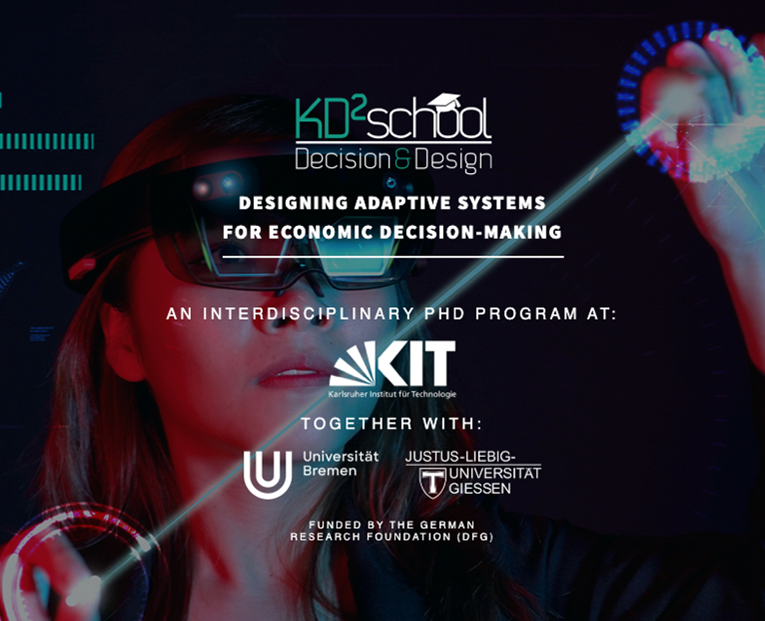
GRK 2739/1: KD2School – Designing Adaptive Systems for Economic Decision-Making
- Contact:
- Project Group:
PDX
- Startdate:
10/2021
- Enddate:
03/2026
Motivation
Economic decisions in business and in everyday life are increasingly supported by IT-based systems. As a result, these systems effectively operate as “cast in code” institutions and processes, and their design influences decision makers’ interactions and behaviors. The interplay between economic decision making and system design is at the core of the KD²School as it lays the foundations for the transformation of static systems into dynamic, adaptive systems.
Generally speaking, all decision-making is inherently embedded in a dynamically changing context comprising of personal (e.g., stress), task-related (e.g., complexity), and environmental factors (e.g., incentives). The key challenge then is to utilize this data and design economic institutions and their IT realizations to dynamically adapt to the context of a decision situation with the goal of improving decisions and/or reducing effort without loss of decision quality.
Objectives and Approach
With its main focus on the design of adaptive, IT-based systems for supporting economic decision-making in dynamically changing contexts the research program of KD²School covers six areas at the intersection of humans, IT-technology, and economic institutions:
1. Fundamentals Of Cognitive Systems & Neurosciences
2. Individuals' Decisions In Everyday Activities
3. Team Decisions In Work Environments
4. Group Decisions In Online Participation
5. Boundaries Of Adaptation & Addiction Potentials
6. Linked Laboratory Infrastructures
Innovations und Perspectives
We realize impactful research through interdisciplinary cooperation, spanning Information Systems, Computer Science, Management, Economics, Psychology and Neuroscience.
In addition, four laboratories provide a strong foundation for highly innovative experimental research.
KD²LAB (KARLSRUHE)
Over 40 booths for large-scale economic and psycho-physiological experiments

CSLAB (BREMEN)
High-resolution sensors and even a camera-fitted room for motion tracking studies

FMRI LAB (BREMEN)
Cutting-edge neuroimaging methqods including a 3-Tesla fMRI scanner

DECIS LAB (GIESSEN)
Virtual reality and eye-tracking methodology at its best

Project partner science
KIT
- Chair Prof. Christof Weinhardt
- Chair Prof. Alexander Mädche
- Chair Prof. Ulrich Ebner-Priemer
- Chair Prof. Martin Klarmann
- Chair Prof. Michael Beigl
- Chair Prof. Petra Nieken
- Chair Prof. Clemens Puppe
- Chair Prof. Benjamin Scheibehenne
University of Bremen
Justus-Liebig University Gießen
Deutsche Forschungsgemeinschaft (DFG) – Funder
Theses
International Seminar „Biosignals in Information Systems and Marketing“: https://im.iism.kit.edu/3347_3408.php

